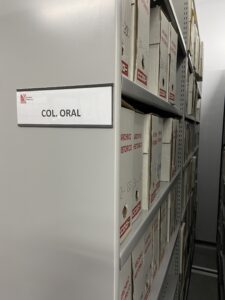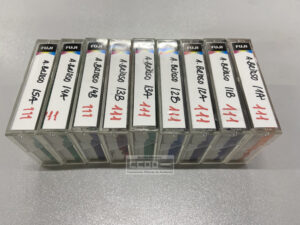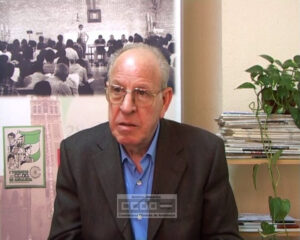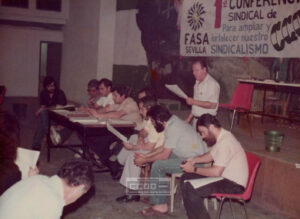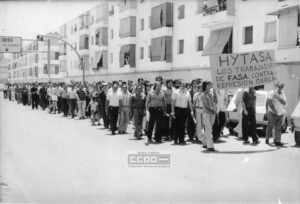“Interview with Antonio Brioso Muñoz”.
Symbol: ES SeAHC 06.1.111.
“Interview with Antonio Brioso Muñoz”.
Antonio Brioso Muñoz (Seville, 1938) is a metalworker who, after several jobs in his childhood and adolescence, went to work in 1957 at the Subsidiary Aviation Industry (ISA). A few years later, in 1961, he emigrated to Baden (Switzerland) where he remained until 1966. On his return to Seville, he began working for the company FASA-Renault and joined the clandestine Comisiones Obreras (Workers’ Commissions). He was elected to the company’s board of directors and during 1967 he led the strikes that FASA workers carried out over overtime and the following year he led, together with other workers, a strike for an improvement in the collective bargaining agreement. The conflict lasted 17 days and Antonio was eventually dismissed.
This interview, conceived as a “life story”, was made on video support (MiniDV) by Marcial Sánchez Mosquera between 14 April and 2 June 2004 in Seville and lasts 515.19 minutes (9 MiniDV tapes). In it, the protagonist provides information about his family origins, the living conditions in Seville in the 1940s and 1950s: housing, eating and dressing habits, education and children’s games, religiosity, etc. In addition, Antonio describes how his political awareness was awakened and his first participation in the Seville demonstrations in 1959, as well as his emigration to Switzerland, where he became aware of the Andalusian grievance, began his democratic experience and joined the Communist Party. He reflects on the reasons that led him to return to Seville in 1966 and his entry into the FASA company in San Jerónimo, on the demands and union elections of that year. He focuses on the description of the company, the working conditions and the main demands. Of special interest are the conflicts of 1967 and 1968, in which he played a leading role, as well as the repression suffered and the solidarity of his colleagues. Finally, he assesses his participation in the workers’ movement during Franco’s regime.
The interview, along with the rest of the interviews in this collection, is a first-hand account of the reality of anti-Francoism through its true architects: working people and anti-Franco militants who, with their clandestine activity and their struggles for freedom, accelerated the crisis of the regime and the democratisation of Spanish society, making the continuity of Francoism unfeasible after the dictator’s death.
AUTHOR OF THE TEXT
Eloísa Baena Luque and Manuel Bueno Lluch
NAME OF IBERARCHIVOS PROJECT
Bibliography:
– Alfonso Martínez Foronda (coord.), La conquista de la libertad: Historia de las Comisiones Obreras de Andalucía (1962-2000), Sevilla, Fundación de Estudios Sindicales, 2005 (2nd edition).
– Marcial Sánchez Mosquera, Del miedo genético a la protesta. Memoria de los disidentes del franquismo, Barcelona, Ediciones de Intervención Cultural / Fundación de Estudios Sindicales, 2008.
– Alfonso Martínez Foronda, Pedro Sánchez Rodrigo and Eloísa Baena Luque, La resistencia andaluza ante el Tribunal de Orden Público en Andalucía : 1963-1976, Sevilla, Fundación de Estudios Sindicales, 2014.
– Eduardo Saborido Galán, Entre la dictadura y la libertad, Córdoba, Utopía Libros, 2023.
Link for online consultation:
https://redi.upr.edu/handle/11722/2974
View full fact sheetPhotographs:
- Detalle del depósito del Archivo Histórico de CCOO de Andalucía (Fuente: AHCOOA).
- Cintas de la entrevista a Antonio Brioso Muñoz realizada en el año 2004 (Fuente: AHCOOA).
- Fotograma de la entrevista a Antonio Brioso Muñoz realizada en Sevilla durante el año 2004 (Fuente: AHCOOA).Andalucía (Fuente: AHCOOA).
- Antonio Brioso interviniendo en la una conferencia de la sección sindical de CCOO en FASA, celebrada en los locales del sindicato. Sevilla, junio de 1982 (Fuente: AHCCOOA – Colección fotográfica).
- Manifestación de trabajadores de ISA en protesta por el asesinato de un trabajador durante un conflicto en Hytasa. Sevilla, [ca. 1977], (Fuente: AHCCOOA – Colección fotográfica).

